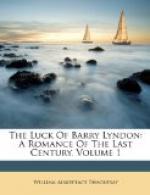’Surely, in the mass of billets you possess from her, there must be enough to compromise her. Look them well over; select passages, and threaten to do so. Write to her at first in the undoubting tone of a lover who has every claim upon her. Then, if she is silent, remonstrate, alluding to former promises from her; producing proofs of her former regard for you; vowing despair, destruction, revenge, if she prove unfaithful. Frighten her—astonish her by some daring feat, which will let her see your indomitable resolution: you are the man to do it. Your sword has a reputation in Europe, and you have a character for boldness; which was the first thing that caused my Lady Lyndon to turn her eyes upon you. Make the people talk about you at Dublin. Be as splendid, and as brave, and as odd as possible. How I wish I were near you! You have no imagination to invent such a character as I would make for you—but why speak; have I not had enough of the world and its vanities?’
There was much practical good sense in this advice; which I quote, unaccompanied with the lengthened description of his mortifications and devotions which my uncle indulged in, finishing his letter, as usual, with earnest prayers for my conversion to the true faith. But he was constant to his form of worship; and I, as a man of honour and principle, was resolute to mine; and have no doubt that the one, in this respect, will be as acceptable as the other.
Under these directions it was, then, I wrote to Lady Lyndon, to ask on my arrival when the most respectful of her admirers might be permitted to intrude upon her grief? Then, as her Ladyship was silent, I demanded, Had she forgotten old times, and one whom she had favoured with her intimacy at a very happy period? Had Calista forgotten Eugenio? At the same time I sent down by my servant with this letter a present of a little sword for Lord Bullingdon, and a private note to his governor; whose note of hand, by the way, I possessed for a sum—I forget what—but such as the poor fellow would have been very unwilling to pay. To this an answer came from her Ladyship’s amanuensis, stating that Lady Lyndon was too much disturbed by grief at her recent dreadful calamity to see any one but her own relations; and advices from my friend, the boy’s governor, stating that my Lord George Poynings was the young kinsman who was about to console her.
This caused the quarrel between me and the young nobleman; whom I took care to challenge on his first arrival at Dublin.
When the news of the duel was brought to the widow at Castle Lyndon, my informant wrote me that Lady Lyndon shrieked and flung down the journal, and said, ’The horrible monster! He would not shrink from murder, I believe;’ and little Lord Bullingdon, drawing his sword— the sword I had given him, the rascal!—declared he would kill with it the man who had hurt Cousin George. On Mr. Runt telling him that I was the donor of the weapon, the little rogue still vowed that he would kill me all the same! Indeed, in spite of my kindness to him, that boy always seemed to detest me.




